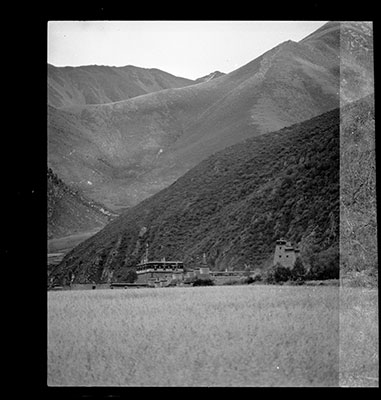
2001.59.15.3.1 (Film negative)


2001.59.15.3.1 (Film negative)

Hugh E. Richardson
Hugh Richardson
1948
East Kyichu Valley Region > Yangri
2001.59.15.3.1
55 x 55 mm
Negative film nitrate
Donated August 2001
The executors of the estate of Hugh E. Richardson
Richardson's 1948 tour of the East Kyichu Valley
NNegative Album 9 No.3
Manual Catalogues - Notes on negative album (slip cover) - 'Drikhung. Chongye. etc.' in Richardson's hand in white. (Yellow spine label) 'DRIKHUNG. CHONGYE. KOTSHAL. RGYAMA. Ganden 1948'. (Cover) - '9 DRIKHUNG. CHONGYE. YARLUNG. GYAMA. GANDEN' [KC 15/5/2006]
Manual Catalogues - Notes in negative index - Folio 3. 'do' [YANG RI DGON] [KC 15/5/2006]
'
Manual Catalogues - Richardson's Handlist, Negative book no 9, 'Drikhung, Chongye etc. [nos] 1-3. 'Yang ri dgon-pa. A monastery of the 'Bri-khung Bka' rgyud-pa (Drikhung Kagyu pa) sect: some 65 miles N.E. of Lhasa. see Khyyen-brtse's Guide to the Holy Places of Central Tibet p.111. note 115.' [KC 15/5/2006]
Other Information - Setting: See Mkhen-brtse's Guide to the Holy places of Central Tibet , Serie Orinetale Roma XVI, Alfonsa Ferrari (Luciano Petech), Rome, Istituto Italiano per il Medio ed Estremo Oriente, 1958, p.111. note 115. "Yan ri dgon lies some 6 miles from 'Bri gun rdson gsar up the Zon ron c'u on the left bank. The river here runs in quite a deep gorge near the dgon pa, but is out of sight. It is said to have been founded by 'P'rin las bzan po ... It contains some 500 monks and appears to be very rich. There are many mc'od rten of 'Bri gun Lamas, liberally covered in gold. ... [note by] H[ugh]. R[ichardson]." [KC 15/5/2006]
Other Information - Setting: Huge Richardson, High Peaks, Pure Earth , London. SerindiaPublications. 1998. p. 308, "Four miles up its [the Sho rong chu valley] stood the great 'Bri-gung-pa monastery of Yang-ri Dgon (1948) dating from the fifteenth century. The massive redpainted lha-khang chen-po, topped by a band of white masonry, with one of crimson brushwood above it, was entered past a line of mchod-rten, through a gateway in the west side of of a long rectangular single-storeyed white wall, pierced by the windows of monks' cells and storerooms, which surrounded the whole monastery. On its south side rose a tall, broad white tower used for the display of the gos-sku , a ceremonial religious banner. ... " [KC 15/5/2006]
Other Information - Richardson visted the monastery in 1948 and wrote a brief description it in High Peaks, Pure Earth , London, Serindia Publications, 1998, p. 308. The monastery dates back to 15th Century. Richardson's description of wall paintings and structure of the monastery is one of the few surviving descriptions of the place. The monastery no longer exists and the surrounding building were destroyed in 1966. [TS 25/4/2005]
Other Information - Dates: The contact print of this image is part of a group made from 6x6 negatives that share the same batch development number [585 printed in black ink]. All of the contact prints processed in this batch seem to have been taken during or around the time of a trip to Drigung Monastery and Zhwai (Sha) Lhakhang, including Tsa Pobrag, Yeregang and Khyer. Photographs from this trip can be dated to 1948. In A Corpus of Early Tibetan Inscriptions [ Hertford: Stephen Austin and Son, Royal Asiatic Society, James G. Forlong Series, No. XXIX, 1985, p.45] Richardson states of the Zhwai inscriptions translated in the book that “The texts, which were first published in JRAS in 1952 and 1954, are based on copies and photographs made by me in 1948 and checked on a second visit in the following year”.
For Citation use:
The Tibet Album.
"Yangri Monastery"
05 Dec. 2006. The Pitt Rivers Museum.
<http://tibet.prm.ox.ac.uk/photo_2001.59.15.3.1.html>.
For more information about photographic usage or to order prints, please visit the The Pitt Rivers Museum.
© The Pitt Rivers Museum